Recent Posts
Sometimes less is more
- steve
- Sep 26, 2017
We just bought some new desks, to replace the old ones that date back to the days of CRT monitors.
The supplier we bought them from, Autonomous, did a nice set of triggered sends throughout the sales process – “we’ve received your order”, “we’ve shipped your order”, “your order has been delivered”.
That’s not rocket science – you plug your ordering system and your FedEx shipping API into your SendGrid API and you’re done.
I’d normally expect glossy, rich-text branded emails with logos and images, but Autonomous went in the opposite direction.
The mail is “From:” Mark@Autonomous, not a generic role account. It’s signed off by Mark, and has his contact info at the end of the email – but in a “I typed my email and phone number here for you” sort of way rather than a fancy signature block. It’s HTML, but it’s not using any images (other than a single tracking image) and is using the mail clients default font.
The first mail has an invoice attached, with a nice customized name (“Laura’s Order.pdf”).
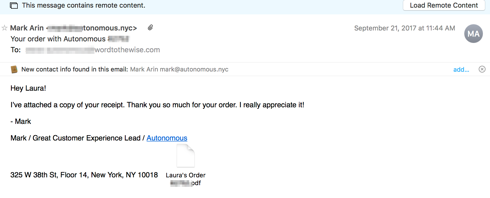
The second one says that the warehouse manager, Eddie, has shipped the order and includes four fedex tracking numbers, all linked to the fedex tracking site, and a soft upsell for an assembly service.
The third links to a youtube video about how to put the desks together, and pulls in Justin, the customer experience manager.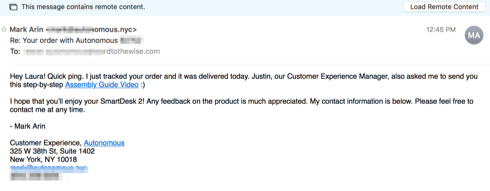
It feels very small company and individual service. But looking at the way the emails are put together, and the times they were sent, I’m fairly sure it’s automatic, templated triggered sends. But I’m not entirely sure, and that’s part of the charm.
Sometimes less is more.
10 things every mailer must do
- laura
- Sep 26, 2017
A bit of a refresh of a post from 2011: Six best practices for every mailer. I still think best practices are primarily technical and that how senders present themselves to recipients is more about messaging and branding than best practices. These 6 best practices from 2011 are no longer best, these days, they’re the absolute minimum practices for senders.
If you can’t manage to do these, then find someone who can.
A DMARC warning
- laura
- Sep 22, 2017
One challenge when implementing DMARC is to ensure that all mail, and I do mean ALL mail is authenticated correctly, before switching to a p=reject notice. The easiest way to do this is to set up a p=none record and check reports to see what mail isn’t authenticated. At least some of this mail is actually going to be valid but unauthenticated email.
I regularly recommend monitoring for 6 – 12 months in order to catch some irregular emails. Even then, someone should regularly monitor DMARC reports in order to identify systems that need authentication added.
One of the cases I worry about is system monitoring emails. These are emails intended to notify sys admins about problems and errors. They often don’t go through the main SMTP server. They usually don’t have an external facing IP and there are security arguments against putting internal IPs into external SPF records. These emails are important and are, usually, not authenticated.
Overall, I could imagine cases where a DMARC record would lead to some problems. And, well, it can. Reading through the postmortem of a significant system failure, one of the problems was no one knew backups weren’t running because notification emails were failing DMARC.
Way to go Equifax
- laura
- Sep 22, 2017
Earlier this month I wrote about how we can’t trust Equifax with our personal data. I’m not sure we can trust them with a cotton ball. Today, we discover Equifax has been sending consumers worried about their personal information leaking to the wrong site.
Read MoreMicrosoft changes
- laura
- Sep 20, 2017
There’s been quite a bit of breakage and delivery failure to various Microsoft domains this month. It started with them changing the MX for hotmail.co.uk, then the MX for hotmail.fr… and both these things seem to have broken mail. I also saw a report this morning that some of the new MXs have TLS certificates that don’t match the hostnames.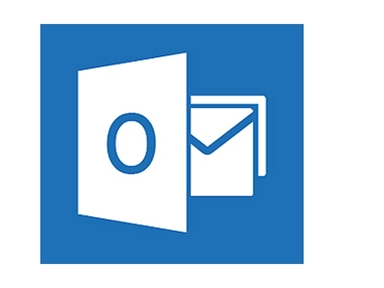
Thinking about deliverability
- laura
- Sep 20, 2017
I was chatting with folks over on one of the email slack channels today. The discussion was about an ESP not wanting to implement a particular change as it would hurt deliverability. It led me down a path of thinking about how we think of deliverability and how that informs how we approach email.
The biggest problem I see is the black and white thinking.
There’s an underlying belief in the deliverability, receiving, and filtering communities that the only way to affect sending behavior is to block (or threaten to block) mail.
This was true back in the ancient times (the late 90’s). We didn’t have sophisticated tools and fast CPUs. There weren’t a lot of ways to handle bad mail other than to block. Now the landscape is different. We have many more tools and the computing capacity to quickly sort large streams of data.
At most places these days, blocking is an escalation, not a warning shot. Many places rate limit and bulk folder questionable mail as a first strike against problem mail. Sometimes the mail is bad enough to result in a block. Other times, it’s not bad enough to block, so it disappears into the bulk folder.
There’s a corresponding belief in the sending community that if their behavior doesn’t result in blocking then they’re acting acceptably. This isn’t true either. There are a lot of things you can do (or not do) that don’t help delivery, but will actively harm delivery. Likewise, there are things you can do that don’t actively harm delivery, but will help. All of these things add up to reaching the inbox.
About those degrees…
- laura
- Sep 19, 2017
There is a meme going around related to the Equifax hack that points out an executive in charge of security doesn’t have a degree related to security.
Surprise! A lot of the folks who currently keep us safe on the internet don’t have degrees in security. They just didn’t exist when we were in school. I think Paul summed it up best:
Targeted advertising
- laura
- Sep 15, 2017
A friend posted a link in IRC pointing at a couch at Wayfair.com. Now I have Wayfair.com ads following me around the internet.
ProPublica wrote an article about how Facebook lets advertisers micro target “jew haters” and other hate groups.
I received this postcard in the mail. 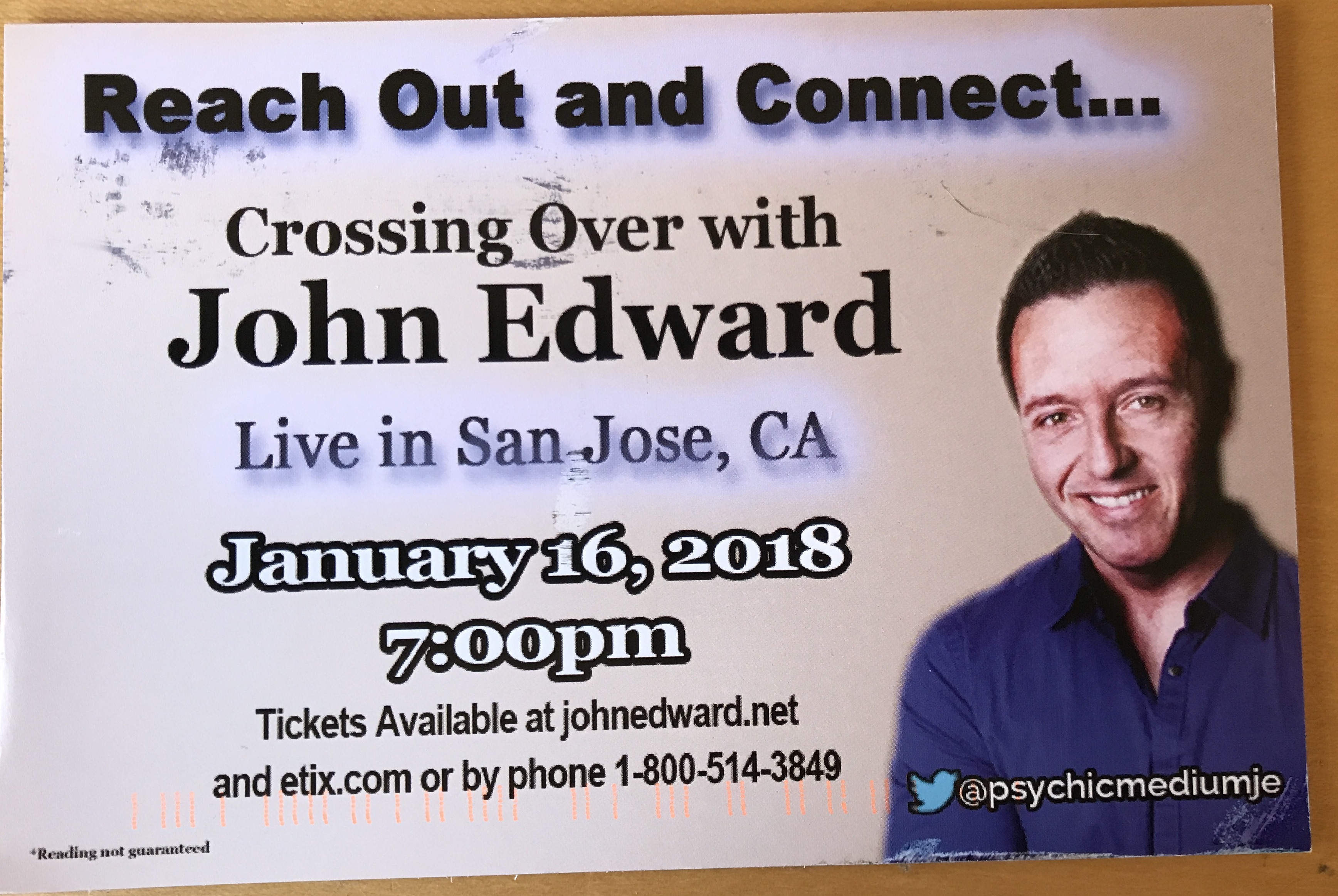
Targeted Advertising.
August 2017: The month in email
- laura
- Sep 13, 2017
Hello! Hope all are keeping safe through Harvey, Irma, Katia and the aftermath. I know many people that have been affected and are currently out of their homes. I am proud to see so many of my fellow deliverability folks are helping our displaced colleagues with resources, places to stay and money to replace damaged property.
Here’s a mid-month late wrapup of our August blog posts. Our favorite part of August? The total eclipse, which was absolutely amazing. Let me show you some pictures.



Ok, back to email.
We’re proud of the enormous milestone we marked this month: ten years of near-daily posts to our Word to the Wise blog. Thanks for all of your attention and feedback over the past decade!
In other industry news, I pointed to some interesting findings from the Litmus report on the State of Email Deliverability, which is always a terrific resource.
I also wrote about the evolution of filters at web-based email providers, and noted that Gmail’s different approach may well be because it entered the market later than other providers.
In spam, spoofing, and other abuse-related news, I posted about how easy it is for someone to spoof a sender’s identity, even without any technical hacks. This recent incident with several members of the US presidential administration should remind us all to be more careful with making sure we pay attention to where messages come from. How else can you tell that someone might not be wholly legitimate and above-board? I talked about some of what I look at when I get a call from a prospective customer as well as some of the delightful conversations I’ve had with spammers over the years.
In the security arena, Steve noted the ongoing shift to TLS and Google’s announcement that they will label text and email form fields on pages without TLS as “NOT SECURE”. What is TLS, you ask? Steve answers all your questions in a comprehensive post about Transport Layer Security and Certificate Authority Authorization records.
Also worth reading, and not just for the picture of Paddington Bear: Steve’s extremely detailed post about local-part semantics, the chunk of information before the at sign in an email address. How do you choose your email addresses (assuming they are not assigned to you at work or school…)? An email address is an identity, both culturally and for security purposes.
In subscription best practices — or the lack thereof — Steve talked about what happens when someone doesn’t quite complete a user registration. Should you send them a reminder to finish their registration? Of course! Should you keep sending those reminders for 16 months after they’ve stopped engaging with you? THE SURPRISING ANSWER! (Ok, you know us. It wasn’t that surprising.)
Google Postmaster bad IP reputation
- laura
- Sep 11, 2017
There are widespread reports this morning (9/11/17) that Google postmaster tools is showing bad IP reputation for IPs starting on 9/9. This issue is affecting just about everyone. Looking through my client’s postmaster pages, I’m seeing red for IP reputation on every client. Even my clients with generally good reputation are seeing bad reputation since 9/9. 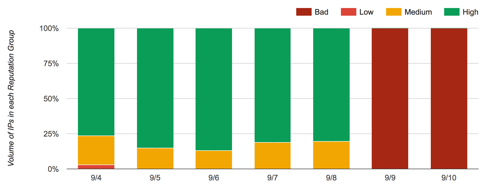 This looks like a reporting or a display error on the part of Google. Many people who are reporting the bad IP reputation are not seeing any significant change in Gmail deliverability.
This looks like a reporting or a display error on the part of Google. Many people who are reporting the bad IP reputation are not seeing any significant change in Gmail deliverability.
Looking through client data it appears that domain reputation reporting stopped on 9/8. I am seeing FBL reports for 9/9 and 9/10, for some but not all clients.
My current read on the situation is that something broke internally with the Gmail postmaster reporting. This does not currently appear to be affecting delivery of mail. (If anyone sees differently, drop me an email or tweet me @wise_laura).
I know folks are making sure Google knows. I know that some Gmail folks were directly notified and another Google person is active on Mailop. And we have confirmation that they are aware and are working on fixing it. I will let you know if I hear of a fix timeline.
EDIT: It’s been fixed. Google even fixed the older data. Same client, screenshot from this morning.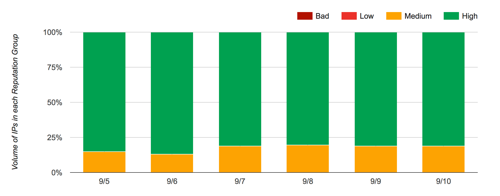
Categories
Tags
- 2010
- 2016
- 2fa
- 419
- 4xx
- 554
- 5xx
- @
- Aarp
- Abacus
- Abandoned
- Aboutmyemail
- Abuse
- Abuse Desk
- Abuse Enforcement
- Abuse Prevention
- Academia
- Accreditation
- Acme
- Acquisition
- Address Book
- Addresses
- Administrivia
- Adsp
- Advanced Delivery
- Advertiser
- Advertising
- Advice
- Affiliate
- Affiliates
- After the Email
- Alerts
- Algorithm
- Alice
- Alignment
- Allcaps
- Alt Text
- AMA
- Amazon
- Amp
- Amsterdam
- Analysis
- Anecdotes
- Anti-Spam
- Anti-Spam Laws
- Anti-Spammers
- Antwort
- AOL
- Appeals
- Appearances
- Appending
- Apple
- Arc
- Arf
- Arrest
- Arrests
- Ascii
- Asides
- Ask Laura
- Askwttw
- Assertion
- Assumptions
- ATT
- Attacks
- Attention
- Attrition
- Audit
- Authentication
- Authentication. BT
- Autonomous
- Award
- B2B
- B2C
- Backhoe
- Backscatter
- Backus-Naur Form
- Banks
- Barracuda
- Barry
- Base64
- Base85
- Bcc
- Bcp
- Bear
- Bears
- Behaviour
- Benchmark
- BESS
- Best Practices
- Bgp
- BIMI
- Bit Rot
- Bitly
- Bizanga
- Black Friday
- Blackfriday
- Blacklist
- Blacklists
- Blast
- Blo
- Block
- Blockin
- Blocking
- Blocklist
- Blocklisting
- Blocklists
- Blocks
- Blog
- Blog Links
- Blogroll
- Blogs
- Bob
- Boca
- Bofa
- Book Review
- Bot
- Botnet
- Botnets
- Bots
- Bounce
- Bounce Handling
- Bounces
- Branding
- Brands
- Breach
- Breaches
- Breech
- Bronto
- Browser
- Bsi
- Bucket
- Bulk
- Bulk Folder
- Bulk Mail
- Business
- Business Filters
- Buying Leads
- Buying Lists
- C-28
- CA
- Caa
- Cabbage
- Cache
- Cadence
- CAH
- California
- Campaign
- CAN SPAM
- Canada
- Candy
- Candycandycandy
- Canonicalization
- Canspam
- Captcha
- Career Developmnent
- Careers at WttW
- Cargo Cult
- Case Law
- Cases
- CASL
- Cat
- Cbl
- CDA
- Cert
- Certification
- CFL
- CFWS
- Change
- Charter
- Cheat
- Cheese
- Choicepoint
- Choochoo
- Christmas
- Chrome
- Cidr
- Cisco
- Civil
- Clear.net
- Clearwire.net
- Cli
- Click
- Click Through
- Click Tracking
- Clicks
- Clickthrough
- Client
- Cloudflare
- Cloudmark
- Cname
- Co-Reg
- Co-Registration
- Cocktail
- Code
- COI
- Comcast
- Comments
- Commercial
- Communication
- Community
- Comodo
- Comparison
- Competitor
- Complaint
- Complaint Rates
- Complaints
- Compliancce
- Compliance
- Compromise
- Conference
- Conferences
- Confirmation
- Confirmed (Double) Opt-In
- Confirmed Opt-In
- Congress
- Consent
- Conservatives
- Consistency
- Constant Contact
- Consultants
- Consulting
- Content
- Content Filters
- Contracts
- Cookie
- Cookie Monster
- COPL
- Corporate
- Cost
- Court Ruling
- Cox
- Cox.net
- Cpanel
- Crib
- Crime
- CRM
- Crowdsource
- Crtc
- Cryptography
- CSRIC
- CSS
- Curl
- Customer
- Cyber Monday
- Czar
- Data
- Data Hygiene
- Data Security
- Data Segmentation
- Data Verification
- DBL
- Dbp
- Ddos
- Dea
- Dead Addresses
- Dedicated
- Dedicated IPs
- Defamation
- Deferral
- Definitions
- Delays
- Delisting
- Deliverability
- Deliverability Experts
- Deliverability Improvement
- Deliverability Summit
- Deliverability Week
- Deliverability Week 2024
- Deliverabiltiy
- DeliverabiltyWeek
- Delivery Blog Carnival
- Delivery Discussion
- Delivery Emergency
- Delivery Experts
- Delivery Improvement
- Delivery Lore
- Delivery News
- Delivery Problems
- Dell
- Design
- Desks
- Dhs
- Diagnosis
- Diff
- Dig
- Direct Mag
- Direct Mail
- Directives
- Discounts
- Discovery
- Discussion Question
- Disposable
- Dk
- DKIM
- Dkimcore
- DMA
- DMARC
- DNS
- Dnsbl
- Dnssec
- Docs
- Doingitright
- Domain
- Domain Keys
- Domain Reputation
- DomainKeys
- Domains
- Domains by Proxy
- Dontpanic
- Dot Stuffing
- Dotcom
- Double Opt-In
- Dublin
- Dyn
- Dynamic Email
- E360
- Earthlink
- Ec2
- Ecoa
- Economics
- ECPA
- Edatasource
- Edns0
- Eec
- Efail
- Efax
- Eff
- Election
- Email Address
- Email Addresses
- Email Change of Address
- Email Client
- Email Design
- Email Formats
- Email Marketing
- Email Strategy
- Email Verification
- Emailappenders
- Emailgeeks
- Emails
- Emailstuff
- Emoji
- Emoticon
- Encert
- Encryption
- End User
- Endusers
- Enforcement
- Engagement
- Enhanced Status Code
- Ennui
- Entrust
- Eol
- EOP
- Epsilon
- Esp
- ESPC
- ESPs
- EU
- Ev Ssl
- Evaluating
- Events
- EWL
- Exchange
- Excite
- Expectations
- Experience
- Expires
- Expiring
- False Positives
- FAQ
- Fathers Day
- Fbl
- FBL Microsoft
- FBLs
- Fbox
- FCC
- Fcrdns
- Featured
- Fedex
- Feds
- Feedback
- Feedback Loop
- Feedback Loops
- Fiction
- Filter
- Filter Evasion
- Filtering
- Filterings
- Filters
- Fingerprinting
- Firefox3
- First Amendment
- FISA
- Flag Day
- Forensics
- Format
- Formatting
- Forms
- Forwarding
- Fraud
- Freddy
- Frequency
- Friday
- Friday Spam
- Friendly From
- From
- From Address
- FTC
- Fussp
- Gabbard
- GDPR
- Geoip
- Gevalia
- Gfi
- Git
- Giveaway
- Giving Up
- Global Delivery
- Glossary
- Glyph
- Gmail
- Gmails
- Go
- Godaddy
- Godzilla
- Good Email Practices
- Good Emails in the Wild
- Goodmail
- Google Buzz
- Google Postmaster Tools
- Graphic
- GreenArrow
- Greylisting
- Greymail
- Groupon
- GT&U
- Guarantee
- Guest Post
- Guide
- Habeas
- Hack
- Hacking
- Hacks
- Hall of Shame
- Harassment
- Hard Bounce
- Harvesting
- Harvey
- Hash
- Hashbusters
- Headers
- Heartbleed
- Hearts
- HELO
- Help
- Henet
- Highspeedinternet
- Hijack
- History
- Holiday
- Holidays
- Holomaxx
- Hostdns4u
- Hostile
- Hostname
- Hotmail
- How To
- Howto
- Hrc
- Hsts
- HTML
- HTML Email
- Http
- Huey
- Humanity
- Humor
- Humour
- Hygiene
- Hypertouch
- I18n
- ICANN
- Icloud
- IContact
- Identity
- Idiots
- Idn
- Ietf
- Image Blocking
- Images
- Imap
- Inbox
- Inbox Delivery
- Inboxing
- Index
- India
- Indiegogo
- Industry
- Infection
- Infographic
- Information
- Inky
- Inline
- Innovation
- Insight2015
- Integration
- Internationalization
- Internet
- Intuit
- IP
- IP Address
- Ip Addresses
- IP Repuation
- IP Reputation
- IPhone
- IPO
- IPv4
- IPv6
- Ironport
- Ironport Cisco
- ISIPP
- ISP
- ISPs
- J.D. Falk Award
- Jail
- Jaynes
- JD
- Jobs
- Json
- Junk
- Juno/Netzero/UOL
- Key Rotation
- Keybase
- Keynote
- Kickstarter
- Kraft
- Laposte
- Lavabit
- Law
- Laws
- Lawsuit
- Lawsuits
- Lawyer
- Layout
- Lead Gen
- Leak
- Leaking
- Leaks
- Legal
- Legality
- Legitimate Email Marketer
- Letsencrypt
- Letstalk
- Linked In
- Links
- List Hygiene
- List Management
- List Purchases
- List the World
- List Usage
- List-Unsubscribe
- Listing
- Listmus
- Lists
- Litmus
- Live
- Livingsocial
- London
- Lookup
- Lorem Ipsum
- Lycos
- Lyris
- M3AAWG
- Maawg
- MAAWG2007
- Maawg2008
- MAAWG2012
- MAAWGSF
- Machine Learning
- Magill
- Magilla
- Mail Chimp
- Mail Client
- MAIL FROM
- Mail Privacy Protection
- Mail Problems
- Mail.app
- Mail.ru
- Mailboxes
- Mailchimp
- Mailgun
- Mailing Lists
- Mailman
- Mailop
- Mainsleaze
- Maitai
- Malicious
- Malicious Mail
- Malware
- Mandrill
- Maps
- Marketer
- Marketers
- Marketing
- Marketo
- Markters
- Maths
- Mcafee
- Mccain
- Me@privacy.net
- Measurements
- Media
- Meh
- Meltdown
- Meme
- Mentor
- Merry
- Message-ID
- Messagelabs
- MessageSystems
- Meta
- Metric
- Metrics
- Micdrop
- Microsoft
- Milter
- Mime
- Minimal
- Minshare
- Minute
- Mit
- Mitm
- Mobile
- Models
- Monitoring
- Monkey
- Monthly Review
- Mpp
- MSN/Hotmail
- MSN/Hotmail
- MTA
- Mua
- Mutt
- Mx
- Myths
- Myvzw
- Needs Work
- Netcat
- Netsol
- Netsuite
- Network
- Networking
- New Year
- News
- News Articles
- Nhi
- NJABL
- Now Hiring
- NTP
- Nxdomain
- Oath
- Obituary
- Office 365
- Office365
- One-Click
- Only Influencers
- Oops
- Opaque Cookie
- Open
- Open Detection
- Open Rate
- Open Rates
- Open Relay
- Open Tracking
- Opendkim
- Opens
- Openssl
- Opt-In
- Opt-Out
- Optonline
- Oracle
- Outage
- Outages
- Outblaze
- Outlook
- Outlook.com
- Outrage
- Outreach
- Outsource
- Ownership
- Owning the Channel
- P=reject
- Pacer
- Pander
- Panel
- Password
- Patent
- Paypal
- PBL
- Penkava
- Permission
- Personalities
- Personalization
- Personalized
- Pgp
- Phi
- Philosophy
- Phish
- Phishers
- Phishing
- Phising
- Photos
- Pii
- PIPA
- PivotalVeracity
- Pix
- Pluscachange
- Podcast
- Policies
- Policy
- Political Mail
- Political Spam
- Politics
- Porn
- Port25 Blocking
- Postfix
- Postmaster
- Power MTA
- Practices
- Predictions
- Preferences
- Prefetch
- Preview
- Primers
- Privacy
- Privacy Policy
- Privacy Protection
- Private Relay
- Productive Mail
- Promotions
- Promotions Tab
- Proofpoint
- Prospect
- Prospecting
- Protocols
- Proxy
- Psa
- PTR
- Public Suffix List
- Purchased
- Purchased Lists
- Purchases
- Purchasing Lists
- Questions
- Quoted Printable
- Rakuten
- Ralsky
- Rant
- Rate Limiting
- Ray Tomlinson
- Rc4
- RDNS
- Re-Engagement
- Read
- Ready to Post
- Readytopost
- Real People
- Realtime Address Verification
- Recaptcha
- Received
- Receivers
- Recipient
- Recipients
- Redirect
- Redsnapper
- Reference
- Registrar
- Registration
- Rejection
- Rejections
- Rejective
- Relationship
- Relevance
- Relevancy
- Removals
- Render Rate
- Rendering
- Replay
- Repost
- Repudiation
- Reputation
- Requirements
- Research
- Resources
- Responsive
- Responsive Design
- Responsys
- Retail
- Retired Domains
- Retro
- Return Path
- Return Path Certified
- ReturnPath
- Reunion.com
- Reverse Dns
- RFC
- RFC2047
- RFC2821/2822
- RFC5321/5322
- RFC5322
- RFC8058
- RFC821/822
- RFCs
- Roadr
- RoadRunner
- Rodney Joffe
- ROKSO
- Role Accounts
- Rollout
- RPost
- RPZ
- Rule 34
- Rules
- Rum
- Rustock
- S.1618
- SaaS
- Sales
- Salesforce
- Sass
- SBCGlobal
- Sbl
- Scam
- Scammers
- Scams
- Scanning
- Scraping
- Screamer
- Screening
- Script
- Sec
- Secure
- Security
- Segmentation
- Selligent
- Send
- Sender
- Sender Score
- Sender Score Certified
- Senderbase
- Senderid
- Senders
- Senderscore
- Sendgrid
- Sending
- Sendy
- Seo
- Service
- Services
- Ses
- Seth Godin
- SFDC
- SFMAAWG2009
- SFMAAWG2010
- SFMAAWG2014
- Shared
- Shell
- Shouting
- Shovel
- Signing
- Signups
- Silly
- Single Opt-In
- Slack
- Slicing
- Smarthost
- Smiley
- Smime
- SMS
- SMTP
- Snds
- Snowshoe
- Soa
- Socia
- Social Media
- Social Networking
- Soft Bounce
- Software
- Sony
- SOPA
- Sorbs
- Spam
- Spam Blocking
- Spam Definition
- Spam Filtering
- Spam Filters
- Spam Folder
- Spam Law
- Spam Laws
- Spam Reports
- Spam Traps
- Spam. IMessage
- Spamarrest
- Spamassassin
- Spamblocking
- Spamcannibal
- Spamcon
- Spamcop
- Spamfiltering
- Spamfilters
- Spamfolder
- Spamhaus
- Spamhause
- Spammer
- Spammers
- Spammest
- Spamming
- Spamneverstops
- Spamresource
- Spamtrap
- Spamtraps
- Spamza
- Sparkpost
- Speaking
- Special Offers
- Spectre
- SPF
- Spoofing
- SproutDNS
- Ssl
- Standards
- Stanford
- Starttls
- Startup
- State Spam Laws
- Statistics
- Storm
- Strategy
- Stunt
- Subject
- Subject Lines
- Subscribe
- Subscriber
- Subscribers
- Subscription
- Subscription Process
- Success Stories
- Suing
- Suppression
- Surbl
- Sureclick
- Suretymail
- Survey
- Swaks
- Syle
- Symantec
- Tabbed Inbox
- Tabs
- Tagged
- Tagging
- Target
- Targeting
- Techincal
- Technical
- Telnet
- Template
- Tempo
- Temporary
- Temporary Failures
- Terminology
- Testing
- Text
- Thanks
- This Is Spam
- Throttling
- Time
- Timely
- TINS
- TLD
- Tlp
- TLS
- TMIE
- Tmobile
- Too Much Mail
- Tool
- Tools
- Toomuchemail
- Tor
- Trademark
- Traffic Light Protocol
- Tragedy of the Commons
- Transactional
- Transition
- Transparency
- Traps
- Travel
- Trend/MAPS
- Trend Micro
- Trend/MAPS
- Trigger
- Triggered
- Troubleshooting
- Trustedsource
- TWSD
- Txt
- Types of Email
- Typo
- Uce
- UCEprotect
- Unblocking
- Uncategorized
- Undisclosed Recipients
- Unexpected Email
- Unicode
- Unroll.me
- Unsolicited
- Unsubcribe
- Unsubscribe
- Unsubscribed
- Unsubscribes
- Unsubscribing
- Unsubscription
- Unwanted
- URIBL
- Url
- Url Shorteners
- Usenet
- User Education
- Utf8
- Valentine's Day
- Validation
- Validity
- Value
- Valueclick
- Verification
- Verizon
- Verizon Media
- VERP
- Verticalresponse
- Vetting
- Via
- Video
- Violence
- Virginia
- Virtumundo
- Virus
- Viruses
- Vmc
- Vocabulary
- Vodafone
- Volume
- Vzbv
- Wanted Mail
- Warmup
- Weasel
- Webinar
- Webmail
- Weekend Effect
- Welcome Emails
- White Space
- Whitelisting
- Whois
- Wiki
- Wildcard
- Wireless
- Wiretapping
- Wisewednesday
- Women of Email
- Woof
- Woot
- Wow
- Wtf
- Wttw in the Wild
- Xbl
- Xfinity
- Xkcd
- Yahoo
- Yahoogle
- Yogurt
- Zoidberg
- Zombie
- Zombies
- Zoominfo
- Zurb